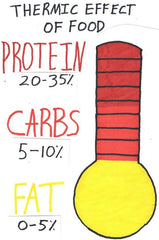- Blog
- Protein: The Long-Lost Secret to Weight Loss | Prolicious
- 4min read
- |
Protein: The Long-Lost Secret to Weight Loss | Prolicious

One important secret that not many speak of, is increasing the amount of protein in the diet, as that is one concrete, well researched fact which helps you to achieve your desired weight!
So how exactly does Protein helps you lose weight?
Protein is an integral part of human body. It is right there in the genes, so from the toenails to the hair, Protein is literally the molecule of life for humans. Higher-protein diets have been encouraged as a successful strategy for preventing or treating obesity by improving body weight management over the last 20 years. These advancements are thought to be the result of changes in energy metabolism, appetite, and energy intake.
Thermic Effect of Protein
On purchase of a product, we need to pay some tax, right? Similarly on consumption of food, the body must burn some calories to break down the food into simple substances for use by the cells. This energy spent is known as the thermic effect of food, hence eating certain foods would help you burn more calories, just by eating them. So, for every 100 calories that you get from protein, you will burn 25 calories, just to digest them!

Eating more Protein prevents you from overeating
If your plate contains more proteins as compared to the carbohydrate, it will help you stay full for longer. The human body speaks with the help of hormones. The two hormones, which regulate hunger is Ghrelin and leptin. When you start feeling hungry, body is releasing ghrelin and when you start feeling full, its because body is releasing leptin and asking you to stop eating. Lots of research in the past 3 decades has shown that a plate full of protein will lead to late release of ghrelin and will promote satiety and reduce the chances of snacking.
Protein can help you to get rid of midnight munching
An Interesting research was carried out on a group of overweight men. They were divided into two groups and were provided normal & High Protein diet. They observed that that protein at 25% of calories reduced cravings by 60% and cut the desire for late-night snacking by half! Hence, having a high protein diet tends to reduce the craving for snacks and hence helps you manage weight or stay on track.

Efficient Ketogenesis
Consuming low carbohydrate, will control the appetite, Addition high protein to the diet leads to having a positive effect on appetite. It altogether leads to a decrease in appetite. It aids to weight loss by avoiding excessive food intake at the following meal even if the total energy intake was low.
So, for a Sustainable weight loss, consume high protein meals in your diet. ICMR suggests that we require 20% of our calories through protein to maintain optimal body functions.
About the Author

Faheela Sarang
MSc. Clinical Nutrition & Dietetics
A food enthusiast by nature & food educator by profession. She is an advocate for Nutrition awareness.
She strongly believes in making small sustainable changes in lives which go a long way in adopting an overall healthy lifestyle.
References
1.Moon, J., & Koh, G. (2020). Clinical Evidence and Mechanisms of High-Protein Diet-Induced Weight Loss. Journal of obesity & metabolic syndrome, 29(3), 166–173. https://doi.org/10.7570/jomes20028
2.Leidy, H. J., Clifton, P. M., Astrup, A., Wycherley, T. P., Westerterp-Plantenga, M. S., Luscombe-Marsh, N. D., Woods, S. C., & Mattes, R. D. (2015). The role of protein in weight loss and maintenance. The American journal of clinical nutrition, 101(6), 1320S–1329S.
3.Drummen M, Tischmann L, Gatta-Cherifi B, Adam T, Westerterp-Plantenga M. Dietary Protein and Energy Balance in Relation to Obesity and Co-morbidities. Front Endocrinol (Lausanne). 2018 Aug 6;9:443. doi: 10.3389/fendo.2018.00443. PMID: 30127768; PMCID: PMC6087750.


